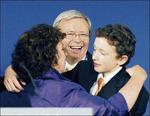

Reuters photos
LEFT: Australian Prime Minister John Howard speaks to his supporters after conceding defeat at a hotel in Sydney, yesterday. Howard conceded defeat at national elections as the Labour opposition swept to power ending 11 years of conservative rule.
RIGHT: Newly elected Prime Minister Kevin Rudd gets a hug from wife Therese Rein and son Marcus after Labour won the Federal election in Brisbane, yesterday. Rudd claimed victory in a national election, ending 11 years of conservative government. The former diplomat has promised to pull Australian combat troops out of Iraq and sign the Kyoto Protocol on climate change.
BRISBANE, (Reuters):
Australia's Labour leader Kevin Rudd, a Mandarin-speaking former diplomat, swept into power at national elections yesterday on a wave of support for generational change, ending 11 years of conservative rule.
"Today, Australia has looked to the future," Rudd, flanked by his wife Therese and family, told jubilant supporters. "I will be a prime minister for all Australians."
The surge to Labour left conservative Prime Minister John Howard struggling to win even his own parliamentary seat, which he has held since 1974, putting him in danger of becoming the first prime minister since 1929 to lose his constituency.
Rudd, 50, presented himself as a new-generation leader by promising to pull Australian combat troops out of Iraq and sign the Kyoto Protocol on climate change, further isolating Washington on both issues.
Rudd is expected to forge closer ties with China and other Asian nations and has said he wants a more independent voice in foreign policy, but yesterday again promised Australia would retain its close alliance with the United States.
Five per cent swing
His message of new leadership attracted a swing of more than five per cent across the nation from the previous election, locking in only the sixth change of government since World War II.
"We've all got goose bumps that finally, we might have a leader who is passionate about fairness in this country," Celeste Giese, 39, told Reuters at Rudd's victory party. "Finally, after 11 years, it's happening," she said.
The election was fought mainly on domestic issues, with Labor cashing in on anger at workplace laws and rising interest rates which put home owners under financial pressure at a time when Australia's economy is booming.
During the campaign, Rudd said one of his first actions would be to lead his country's delegation to December's international climate talks in Bali, emphasising that Australia hopes to take a lead role in efforts to combat global warming.
Howard, who had won four consecutive elections and held power for 11 years, conceded his government had lost power in front of a crowd of supporters in Sydney late on Saturday, saying he took full personal responsibility for the defeat.
"This is a great democracy and I want to wish Mr. Rudd well," Howard said. "We bequeath to him a nation that is stronger and prouder and more prosperous than it was 11-1/2 years ago."
Election analyst Antony Green predicted Labour would win more than 80 seats in the 150-seat parliament, giving it a clear majority in its own right for the first time since it lost power to Howard in 1996.
The result will mean Labour is in power nationally and in all of Australia's six states and two territories, with the lord mayor of the northern city of Brisbane now the senior ranking elected official in Howard's Liberal Party.
Howard had won four consecutive elections and was Australia's second-longest serving prime minister behind Liberal Party founder Sir Robert Menzies. He had trailed in opinion polls all year.
Strong economic record
A staunch U.S. ally committed to keeping Australian troops in Iraq, he offered voters income-tax cuts, but few new policies, instead highlighting his strong economic record and attacking Labour's links to the trade union movement.
With 73 per cent of the vote counted in Howard's seat of Bennelong, election officials put him just behind Labour's high-profile rookie candidate, former national television political journalist, Maxine McKew.
"This has been an amazing night, a wonderful night for Labour, a fabulous, I hope, transforming, moment for the country," McKew told cheering supporters, adding it might be weeks before a winner is declared.
At a sombre Liberal Party headquarters, party faithful were putting a brave face on the defeat.
"I just hope the public now gives John Howard some kudos for what he's done over the years," said David Bennett, a member of the Young Liberals, the youth wing of the Liberal Party.

